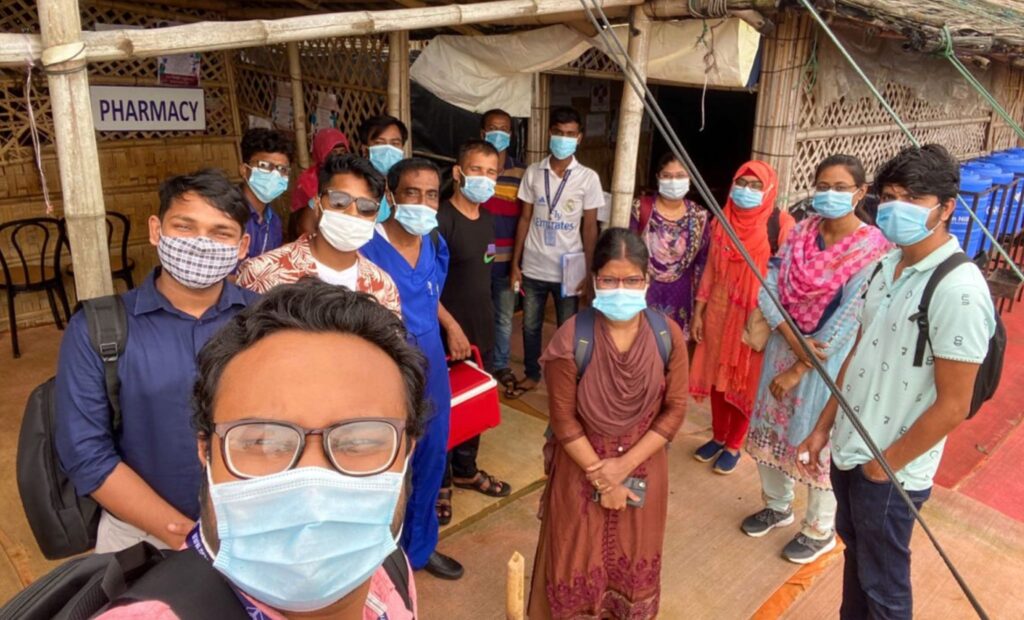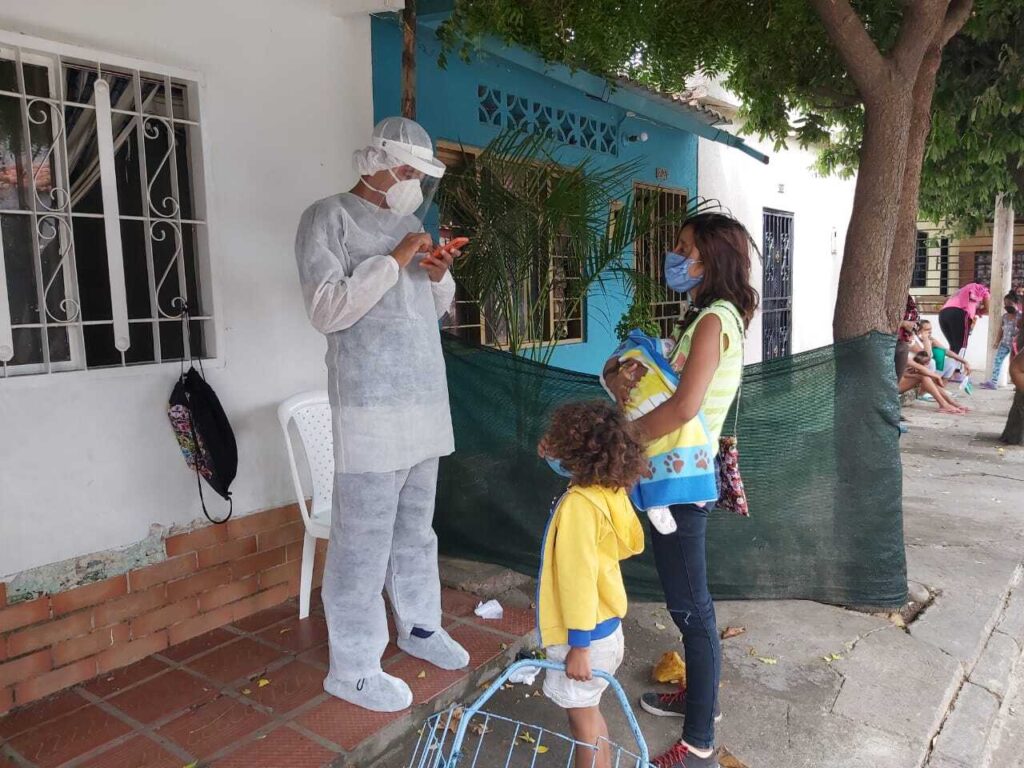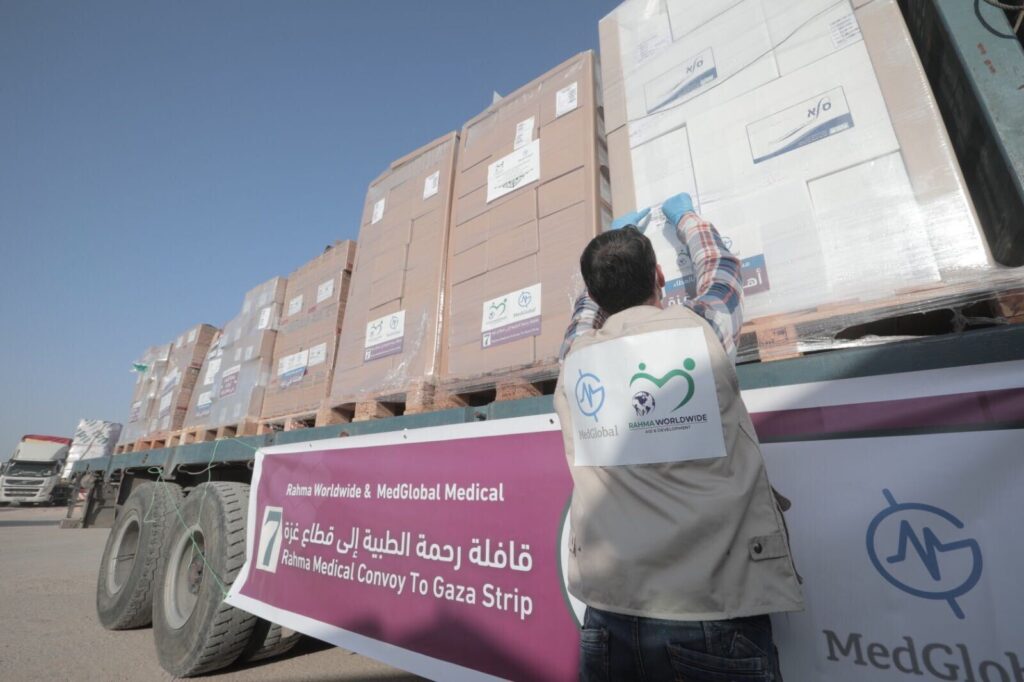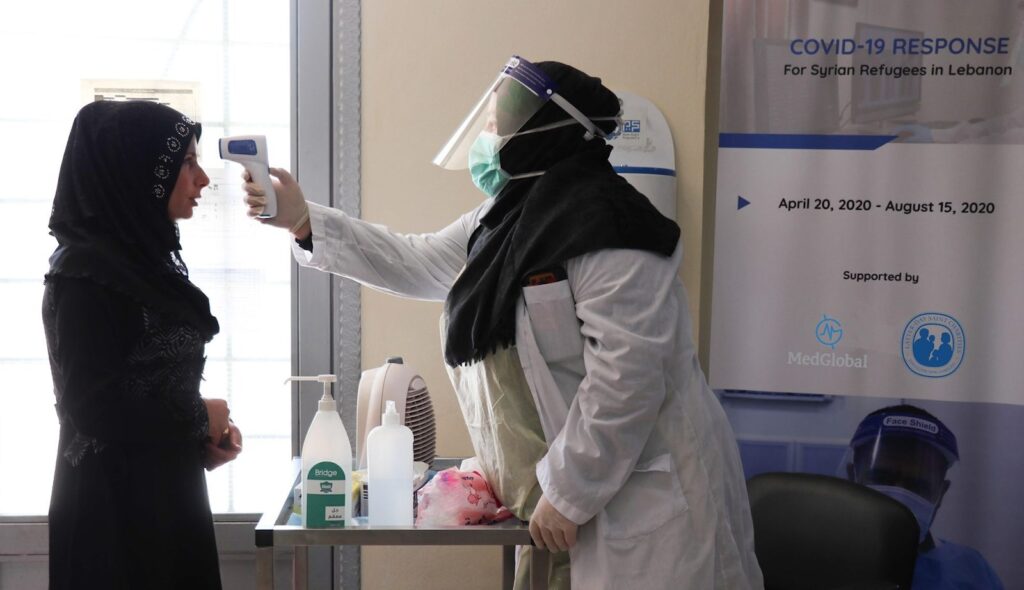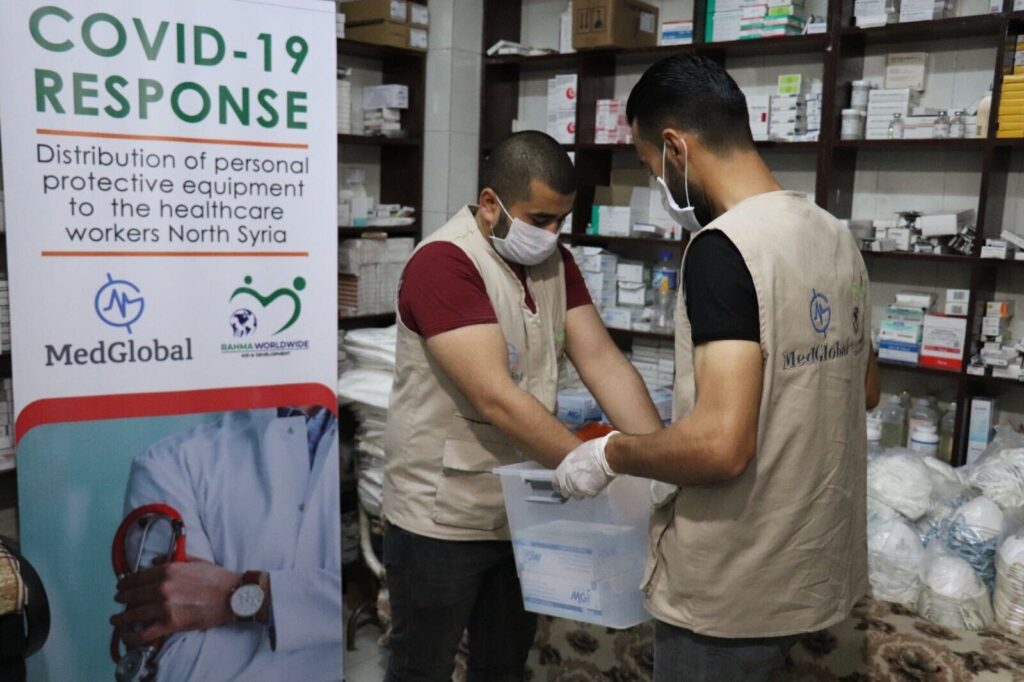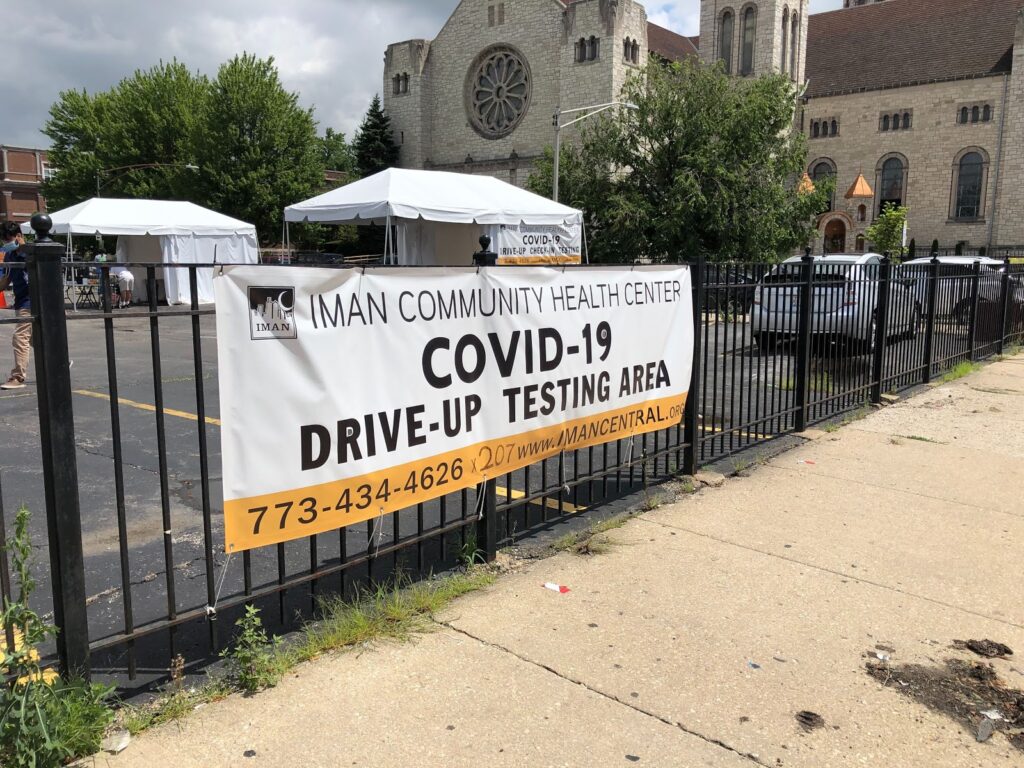Updates & Press
COVID-19 Featured | October 9, 2020
Our Global COVID-19 Response: 6 Months In
Author | MedGlobalComms
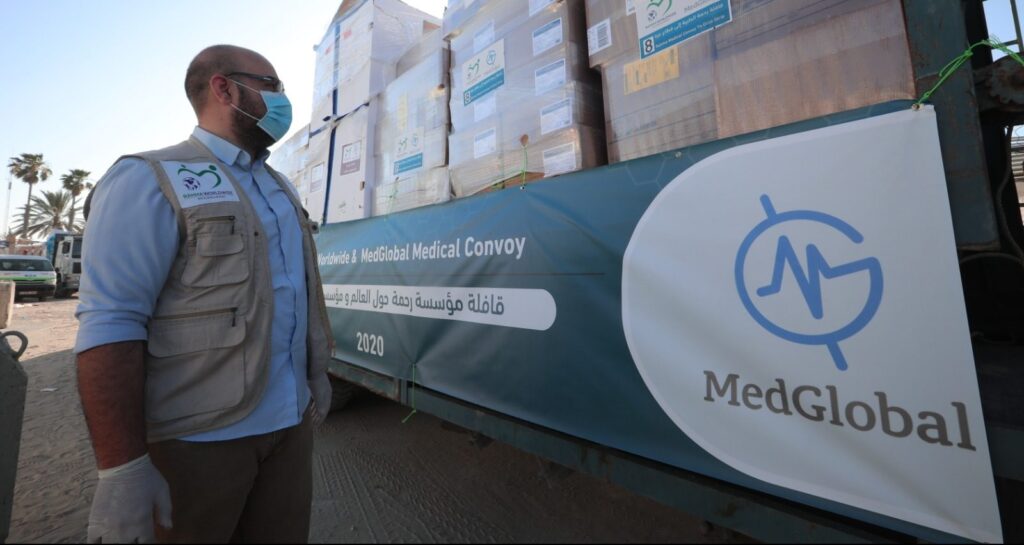
Since the COVID-19 pandemic began, MedGlobal increased the scope and scale of its medical responses, providing critical supplies and training for the COVID-19 response while continuing to support core health services. We know that COVID-19 has the most severe impact on vulnerable communities, and our COVID-19 response has particularly focused on supporting healthcare access for refugees, displaced people, and other marginalized populations. We have supported COVID-19 prevention and response efforts in Bangladesh, Colombia, Ecuador, Gaza, Greece, Lebanon, Sudan, Syria, Yemen, and the United States. As the pandemic continues, we will continue to work with local medical professionals to innovate our health response to best protect health staff and support communities with a range of health services.
Our Global Response in Numbers:
- Responded to COVID-19 outbreaks in 10 countries.
- Provided more than $1.85 million towards the COVID-19 response globally
- Donated over 982,000 items of personal protective equipment (PPE) and over 37,000 critical medical supplies, such as PCR machines, oxygen cylinders, ventilators, sanitizing materials, and other supplies to help communities protect themselves from COVID-19 and to treat those who are affected.
- Trained 393 healthcare workers.
- Reached more than 1.75 million people through our COVID-19 response in just 6 months.
Join us in supporting communities around the world with critical healthcare.
How We Are Responding to COVID-19
Over the last 6 months of the pandemic, our medical teams have worked to meet the specific needs of vulnerable communities in 10 different countries. We could not have done this work without all of our donors, including the Latter-day Saints Charities, who have generously supported our life-saving COVID-19 programs. Our core objectives in our global COVID-19 response are:
- Protect Health Workers. During the pandemic, physicians and health staff have become frontline workers who risk their lives daily to treat patients. Personal protective equipment (PPE), such as masks, gloves, and gowns, is critical in preventing the transmission of COVID-19 from patients to the medical professionals who treat them. MedGlobal has distributed over 982,000 items of PPE to health workers around the world. MedGlobal particularly focuses on supporting health staff in countries like Yemen and Syria, where health infrastructure has been decimated by war and there are less than half the health workers necessary to meet the WHO’s benchmark for basic health coverage.
- Serve Patients with COVID-19. For patients with severe COVID-19 symptoms who require hospitalization, oxygen is key. Working with health facilities that primarily treat refugees, displaced persons, and other vulnerable communities, MedGlobal identified the key needs and best means of oxygen provision to fit the local contexts. In Colombia, Gaza, and Syria, we provided ventilators to support COVID-19 patients in hospitals, as well as CPAP and BIPAP machines, which are non-invasive ventilators for people suffering from severe COVID-19 symptoms. In Syria and Yemen, MedGlobal distributed hundreds of oxygen concentrators to hospitals, which will deliver oxygen to COVID-19 patients and others with respiratory distress.
- Improve COVID-19 Testing Capacities: In underserved areas around the world, the lack of access to COVID-19 testing can lead to a wider spread of the virus. In Gaza, hospitals suffer from a 65% shortage of laboratory supplies, which affects COVID-19 testing and other needs of patients. MedGlobal supported the local testing capacity in Gaza by providing 10,000 test kits and a critically needed PCR machine, to allow for more rapid testing. Domestically, MedGlobal also supported the Saint Anthony’s Hospital in Chicago, which primarily treats underserved communities of immigrants and people of color, with a PCR machine and test kits.
- Train Health Workers in Critical Skills: Training for medical professionals in COVID-19 prevention and patient management is critical, as health workers adapt to this unfamiliar context. Based on the local health worker needs, MedGlobal launched online trainings focused on key COVID-19 response and preparedness practices. We initiated two online training series for clinic staff Bangladesh to help them best treat Rohingya refugee communities in the Cox’s Bazar camps, and a four-part online training for physicians and nurses in Santa Elena, Ecuador who were facing the epicenter of Ecuador’s coronavirus outbreak.
- Support Mental Health: The fear of contracting COVID-19, isolation from social distancing, difficulties from significant changes in daily life, and other added stresses are taking a mental health toll. The MedGlobal team believes that mental health is a priority alongside physical health, and has scaled up its mental health and psychosocial support through activities like training for Bangladesh clinic staff in promotion of mental healthcare for the staff themselves, and a mental health referral network in downtown Beirut following the port explosion.
- Build Health Facility Capacity: Many health facilities in conflict-affected and low-resource settings already lacked key infrastructure and equipment pre-COVID, and found themselves overwhelmed as the pandemic hit. In Bangladesh, Colombia, Ecuador, Gaza, Lebanon, Syria, Yemen, and in our headquarters of Chicago, Illinois, MedGlobal worked with local health facilities to identify key needs, and provide the most-needed supplies. We worked to improve hospitals’ and isolation units’ capacity for patient management through donating critical supplies and equipment like hospital beds, infrared thermometers, disinfectant, PCR machines and ktis, and more.
- Lead Health Education for Communities: Community-based health awareness and education campaigns are key to ensure that people are informed about how to prevent the transmission of COVID-19. Around the world, MedGlobal has worked with local communities and health workers to support health education campaigns ensuring that local knowledge and cultures inform COVID-19 prevention and response work. MedGlobal distributed educational brochures on social isolation and personal hygiene to quarantine centers in Gaza, led health education sessions for clinic patients in Bangladesh on handwashing and COVID-19 symptoms, and launched a training series for health workers in Ecuador who led their own COVID-19 education campaigns based on MedGlobal training.
Our International Response
Bangladesh
Over 900,000 Rohingya refugees currently live in camps in Cox’s Bazar. The living conditions in these camps are grim, with a lack of sanitation and medical facilities, shortage of soap, extreme overcrowding, and poor water quality. On May 14, the first cases of COVID-19 were confirmed inside the camps.
MedGlobal’s primary health clinic, which we support alongside OBAT Helpers and Prantic, in Cox’s Bazar has remained open to provide ongoing care for Rohingya refugee patients. Working with MedGlobal health experts, clinic staff established triage procedures, clinical management protocols, and health education sessions for patients on handwashing, social isolation, and COVID-19 symptoms. MedGlobal also initiated two online training series for clinic staff, on the topics of COVID-19 management practices and the promotion of mental healthcare for the staff themselves and their patients. MedGlobal helped to provide the clinic with supplies to adapt to the pandemic, including over 4,800 PPE sets and critically needed supplies like infrared thermometers. The MedGlobal team is also in the process of building a central oxygen line to Ukhia Upazila Health Complex. In addition to the on-the-ground health response, MedGlobal detailed the latest health needs and challenges during the pandemic in a report based on comprehensive needs assessments, Rohingya Refugees & COVID-19: Facing the Pandemic in the World’s Most Densely Populated Refugee Camps.
Colombia
Colombia hosts 1.8 million Venezuelan migrants and refugees. While Colombian hospitals provide free emergency care to migrants, non-emergency services are not covered and overwhelmed health facilities make healthcare difficult to access. The COVID-19 pandemic has exacerbated this situation.
MedGlobal partners with Institucion Prestadora de Servicio Medcare Colombia S.A.S. to operate a primary care clinic supporting maternal and child health services in Cúcuta, Colombia, on the border of Venezuela. In this setting, MedGlobal supports Venezuelan migrants, refugees, and underserved Colombians, primarily pregnant women and young children. As COVID-19 spread in Colombia, MedGlobal adapted our services to scale up COVID-19 response support while continuing to provide comprehensive maternal and reproductive health services. MedGlobal donated 3 portable ventilators to University Hospital Erasmo Meoz in Cúcuta, which are used for a newly constructed COVID-19 treatment center, and 330 hygiene kits to the local community. MedGlobal also redirected local medical clinic staff to help with the COVID-19 response based on the overall community needs.
Ecuador
Ecuador’s COVID-19 outbreak wreaked havoc on Guayaquil, Ecuador’s most populous city with over 2.7 million inhabitants. The city became the epicenter of the outbreak in Ecuador and thousands died during the early months of the pandemic.
MedGlobal worked with urgency to support this community, providing over 70,000 PPE items and medications for 6,000 patients in Santa Elena, more than any other NGO. MedGlobal and our partners Parametria and the MUEVE Foundation also supported 500 families of displaced Venezuelans in Guayaquil neighborhoods who were greatly impacted by COVID-19 with food and hygiene kits. In partnership with Santa Elena Governorate and Parametria, MedGlobal launched a four-part virtual training for health workers in Santa Elena. These health workers conducted home visits for patients, primarily those with non-communicable diseases, and led COVID-19 education campaigns based on MedGlobal training. MedGlobal also provided training on basic concepts on clinical management of COVID-19 patients for local physicians and nurses. We also helped conduct a survey to learn more about socio-demographics and perceptions and knowledge of COVID-19 within the province, to help better inform the response.
Gaza
COVID-19 cases were first documented in Gaza in early March, but the virus did not begin to spread rapidly until August. Gaza’s fragile health system, with only 87 ventilators, is ill-equipped to manage the needs of its 2 million people.
Along with our partner Rahma Worldwide, MedGlobal has donated critical supplies to local hospitals, including over 630,000 PPE items and 12,000 hand sanitizers. MedGlobal also provided 10,000 COVID-19 test kits and a critically needed PCR machine, to help build testing capacity and stem the spread of the virus. Furthermore, MedGlobal distributed educational brochures on social isolation and personal hygiene to quarantine centers. In addition to the COVID-19 response, MedGlobal continues to support core healthcare in Gaza. MedGlobal and Rahma Worldwide together fund the pediatrics ICU department of the Kamal Adwan Hospital. This emergency pediatrics department is critical, particularly as the people in Gaza are cut off from external healthcare, and its medical staff have saved over 100 children’s lives. MedGlobal also supports life-saving dialysis treatments for patients with cancer or kidney disease.
Greece
MedGlobal has been providing healthcare to refugees in the Moria camp on Lesvos Island, Greece, since 2018 by supporting a health clinic along with our partner Kitrinos Healthcare. MedGlobal particularly supported the salaries of a local physician and nurse. In the first few months of the pandemic, MedGlobal launched an online training for health clinic staff on COVID-19 preparedness and clinical management of COVID-19 patients.
On September 8, devastating fires tore through the overcrowded Moria camp, burning the camp to the ground and forcing thousands of refugees and asylum seekers to flee. This fire occurred just one week after COVID-19 cases were confirmed in the camp.The fire destroyed the health clinic MedGlobal supports, along with all of its medical equipment, supplies, and medicine in the clinic. Thankfully, our clinic staff, partners, and their families are safe. MedGlobal is now working with Kitrinos to assess how best we can support healthcare for refugees and migrants on Lesvos Island as they cope with displacement, uncertainty, and the COVID-19 outbreak.
Lebanon
Lebanon is facing a spiralling economic crisis and growing needs among the population, while simultaneously trying to mitigate the spread of COVID-19. At the same time, Lebanon remains the country with the largest number of refugees per capita, including over 1.5 million Syrian refugees. In collaboration with our partner Multi Aid Programs (MAPs), MedGlobal has supported health facilities in Bekaa with medication and over $12,000 of critically needed PPE. These facilities primarily serve Syrian refugees, who are particularly vulnerable to the COVID-19 pandemic. MedGlobal has also provided the facilities with over 55,000 medications and over 20,000 of the most needed medical supplies, so their health providers can continue to serve refugees and members of the local community.
The devastating Beirut port explosion on August 4 further exacerbated the political, economic, and humanitarian crises in the country. In addition to our COVID-19 response, MedGlobal launched an emergency response, which established a medical tent that provided care for affected individuals during the first month post-blast, when hospitals were most overwhelmed. MedGlobal also provided local hospitals with critically needed supplies, to fill gaps following the surge in healthcare needs after the explosion. MedGlobal is providing medications and PPE to Rafik Hariri University Hospital in Beirut and, in collaboration with United Hands Relief and Development, supporting Rizk Hospital in Beirut with the most needed medications, supplies, and equipment.
Sudan
In Sudan, communities are facing the COVID-19 pandemic alongside other crises like a recent polio outbreak and the effects of record-breaking floods. Throughout Sudan, health facilities are facing major shortages of medications and funding to mitigate COVID-19 and other health crises. MedGlobal responded to the COVID-19 crisis in Sudan by supporting 8 hospitals in Khartoum, Al-Gezira, North Kordofan, West Kordofan, Qadarif, and Sennar, through the provision of PPE and medical equipment. MedGlobal provided over 86,000 PPE items to local health workers and supplied hospitals with their most critically needed supplies, such as non-contact thermometers and oxygen regulators. Along with this support, MedGlobal is also in the process of building an oxygen generator at Nyala Teaching Hospital in South Darfur, which will be able to support patients with extreme COVID-19 symptoms or other respiratory illnesses in an extremely underserved community.
Syria
In Syria, the conflict has led to staggering levels of death and need inside the country, decimated the country’s medical infrastructure, and led to the world’s largest displacement crisis. The impact of the pandemic is adding to an already dire humanitarian situation in Syria, nine years into the emergency conflict.
In northwest Syria, MedGlobal, alongside our partner Rahma Worldwide, has worked to provide oxygen concentrators, crucial to help COVID-19 patients experiencing severe symptoms to breathe, and other support to health facilities and isolation units in Darkoush and Idlib City. MedGlobal also worked with local partners to distribute over 58,000 PPE items and 5,000 personal hygiene kits to support vulnerable Syrian families in the Atmeh IDP camp. Additionally, in August MedGlobal began to provide 200 oxygen concentrators and 100 CPAP and BIPAP machines, or non-invasive ventilators to help people who are suffering from severe COVID-19 symptoms breathe, to cities throughout Syria in partnership with local independent NGOs. These medical supplies will support upwards of 2,000 people, primarily those with COVID-19 who are not financially able to access healthcare, over the next 6 months in Aleppo, Damascus, Homs, Latakia, Hama, Zabadani, Bludan, and Safita.
Yemen
More than five years of conflict, health crises, and malnutrition have left 80% of Yemenis in need of humanitarian assistance. Only half of Yemen’s healthcare facilities are fully functional, but of these, many lack basic equipment, including the gloves, masks, and oxygen necessary for treating COVID-19 patients.
Since the COVID-19 outbreak spread to Yemen, MedGlobal, in coordination with our local partners Rahma Worldwide and Life Foundation, has supported local hospitals and isolation centers with supplies to protect medical staff as they treat patients, and critical oxygen and medical equipment to treat those with severe COVID-19 symptoms. We have provided over 98,000 PPE items to protect medical staff – particularly important in Yemen, where there are only 10 healthcare workers for every 10,000 people, less than half of the WHO benchmark for basic health coverage. MedGlobal also provided 139 oxygen cylinders to several hospitals in governorates across Yemen. Oxygen supplies to treat patients with severe COVID-19 symptoms is particularly critical in Yemen, as the official COVID-19 mortality rate is 29%, over 5 times the global average. With COVID-19 numbers spiking, MedGlobal worked with local medical professionals to put together the report A Tipping Point for Yemen’s Health System: The Impact of COVID-19 in a Fragile State which documented the deaths of over 100 health workers in Yemen from COVID-19 and provided policies recommendations. In addition to the COVID-19 response, MedGlobal continues to support local hospitals in Aden, Marib, Al-Hudaydah, Taiz, Hadramout, and Sana’a with critical medicine, ultrasound machines, cardiac equipment, surgical supplies, and hospital beds.
Our Domestic Response:
Domestically, MedGlobal is committed to supporting hospitals and testing sites which focus on supporting particularly marginalized and underserved communities. These communities are disproportionately affected by COVID-19 with both higher rates of infection and mortality from the virus. The latest overall COVID-19 mortality rate for Black Americans is 2.4 times as high as the rate for White Americans, and in several states like Arizona, the COVID-19 mortality rate for Indigenous people is more than 5 times that of other groups. This dramatic disparity has roots in the centuries of structural racism in the United States, which is itself a public health crisis.
Chicago
In Chicago, African Americans account for more than half of all COVID-19 cases and 72% of COVID-19 related deaths, despite making up 30% of the population. MedGlobal is proud to support Saint Anthony Hospital in Chicago, which is a safety-net hospital that primarily treats underserved communities of immigrants, people of color, and those facing economic hardship. MedGlobal donated over 12,000 PPE items, a point-of-care ultrasound device, and a PCR machine, which will allow for rapid COVID-19 testing, to Saint Anthony Hospital. We also helped Inner-City Muslim Action Network (IMAN) to launch a much-needed drive-through community testing site in Chicago, in order to reduce the barriers to seeking testing, and supported testing center staff with over 9,000 PPE items.
Navajo Nation
The Navajo Nation spans across a 27,413 mile area and has a population of 173,000 people. A third of households lack access to electricity and running water and healthcare facilities have only 1 bed for every 900 residents, a third of the national average. As of October 4, the Navajo Nation has had over 10,000 confirmed COVID-19 cases and more than 559 deaths.
MedGlobal provided support for the Chinle Comprehensive Healthcare Facility, a hospital which serves as the healthcare hub for the Navajo Nation in Arizona. We donated medical supplies and equipment that are critical to treat COVID-19 patients, and recruited nurse volunteers who were urgently needed to staff the hospital.


